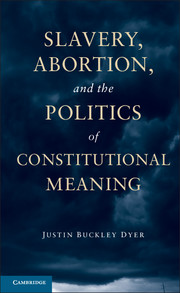Book contents
- Frontmatter
- Contents
- Acknowledgments
- Preface
- 1 The Conscience of a Nation
- 2 Substance, Procedure, and Fourteenth Amendment Rights
- 3 Dred Scott, Lochner, and the New Abortion Liberty
- 4 Constitutional Disharmony after Roe
- 5 The Politics of Abortion History
- 6 Private Morality, Public Reasons
- 7 Personhood and the Ethics of Life
- Index
- References
2 - Substance, Procedure, and Fourteenth Amendment Rights
Published online by Cambridge University Press: 05 April 2013
- Frontmatter
- Contents
- Acknowledgments
- Preface
- 1 The Conscience of a Nation
- 2 Substance, Procedure, and Fourteenth Amendment Rights
- 3 Dred Scott, Lochner, and the New Abortion Liberty
- 4 Constitutional Disharmony after Roe
- 5 The Politics of Abortion History
- 6 Private Morality, Public Reasons
- 7 Personhood and the Ethics of Life
- Index
- References
Summary
Although President Bush’s seemingly esoteric reference to Dred Scott during a televised debate in 2004 “left many viewers mystified,” it was familiar territory for those acquainted with the contours of the American abortion debates. Prominent judges and politicians, from Ronald Reagan and Robert Bork to Antonin Scalia and Orrin Hatch, have long argued that Roe v. Wade and Dred Scott were cut from the same cloth, and, in some quarters, criticism of Dred Scott has simply become tantamount to criticism of the Court’s general approach to abortion rights. As a matter of constitutional law, the legal doctrine of “substantive due process” – employed in both Dred Scott and Roe – is particularly troubling to many of the Court’s modern detractors. The standard criticism of Dred Scott along these lines is that it laid the foundation for the Supreme Court’s controversial decision in Roe v. Wade by illicitly putting a substantive gloss on the Constitution’s Due Process Clause so as to strike down a legitimate legislative enactment.
The Fifth Amendment prohibits the federal government from depriving any person of “life, liberty, or property without due process of law,” and on its face the language of the clause seems to be concerned only with the legal procedures by which the government may deprive individuals of life, liberty, or property. Yet the Court declared in Dred Scott that a legislative act barring slavery from the federal territories “could hardly be dignified with the name due process of law.” There was, in other words, a substantive component to the Due Process Clause – in this case, a right to own and traffic in slaves – that was insulated from ordinary legal procedures.
- Type
- Chapter
- Information
- Publisher: Cambridge University PressPrint publication year: 2013

